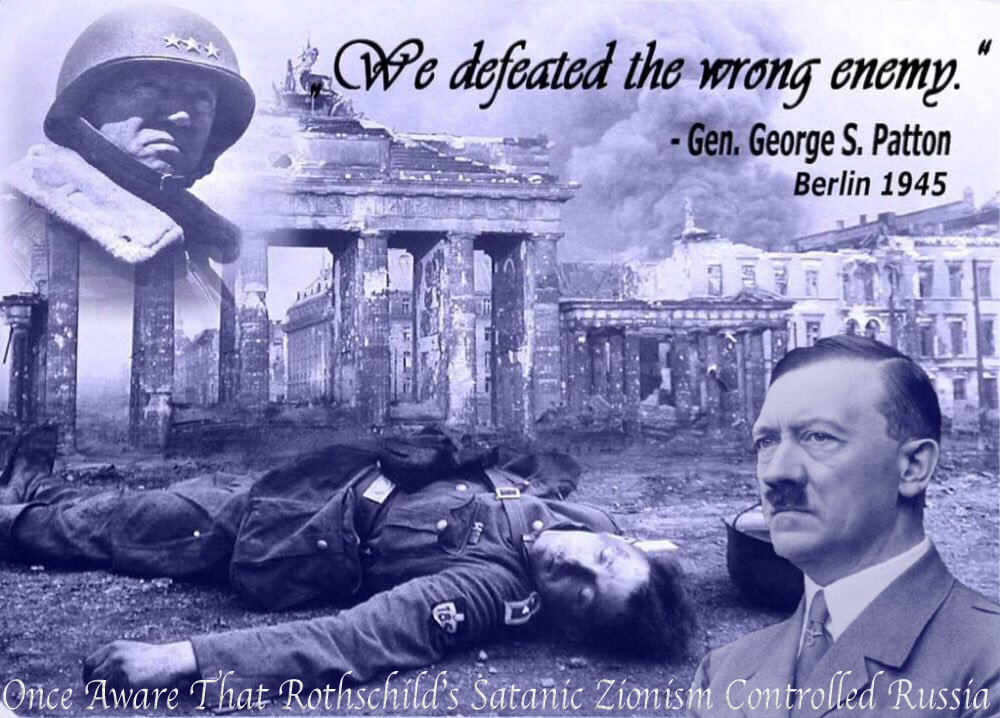
Expanding WWII Pt 2: Why Gen. Patton Was a Hero
Many people don’t know that General Patton and his Third Army wanted to continue fighting. General Patton, unlike most people of the day realized the true threat that the Soviets posed not just to America, but also, more importantly, to Europeans. See, after the war, the Soviets occupied a number of countries and the citizens of these countries were worse off under Stalin than they ever were under Hitler. Today, a misinformed America still thinks of Stalin as good ol’ “Uncle Joe,” the war hero. Nothing could be further from the truth.
See, the non-Nazi Germans realized this. Yes, believe it or not, there were Germans who were not Nazis, who were disgusted by the Nazis, but were fighting for their country simply because they wanted to keep it safe from Stalin. Turned out, they were right.
A good number of these men were in the Luftwaffe, you may be familiar with the Luftwaffe – or at least it’s POW camps – thanks to Hogan’s Heroes. There is a level of truth in this show, in that the majority of the Luftwaffe (barring Göring, of course) were not Nazis. They were Germans fighting for their homeland, just like the British and the Americans.
Now, as the war was wrapping up, these men would willing surrender to the British or the Americans, but not the Soviets because they were aware that the Soviets did not play by the rules of war. At the same time, they were hoping that at the war’s end, they would join forces with the Allies and defeat the Soviets.
Turns out, they, and many others, and approached Patton on this subject. Pleading with him to do something to free them from the grips of the Soviets. Patton was inclined to help. Many others were not:
“Patton burst out, ‘It’s all a God-damned shame . . . Day after day, some poor bloody Czech, or Austrian, or Hungarian, even German officers come into my headquarters. I almost have to keep them from going down on their knees to me. With tears in their eyes they say, “In the name of God, general, come with your army the rest of the way into our country. Give us a chance to set up our own governments. Give us this last chance to live before it’s too late, before the Russians make us slaves forever.”’
“‘That’s what they tell me, and every damned one of them has offered to fight under my flag and bring their men with them. Hell, a German general offered his entire air fore, the Third, to fight the Russians if necessary. . . . By God, I would like to take them up on it. I’ll feel like a traitor if I don’t.’
“At that point, writes [Fred] Ayer [Jr., nephew to Patton], an ‘uneasy, feeling swept the room.
“Patton disregarded it.
“‘These people are right. They won’t have a chance. We’ve signed away their lives. By God, we ought to tear up those damned fool agreements [with the Soviets] and march right through to the eastern borders. . . .’
“Ayer, worried for his uncle, blurted out, ‘Uncle George . . . you can’t talk that way here.’
“Patton shot back coldly, ‘Yes I can. I’ll talk any damned way I want. I know what we ought to do. We promised these people freedom. It would be worse than dishonorable not to see that they have it. This might mean war with the Russians, of course; but what of it? They have no air force any more, their gas and munitions supplies are low. I’ve seen their miserable supply trains . . . I’ll tell you this . . . the Third Army alone . . . could lick what’s left of the Russians in six weeks. . . . Mark my words. . . . Some day we’ll have to fight them. . . .’”
Patton and his Third Army realized the threat that Stalin and the Soviets posed. They were willing to continue the fight and to risk their lives to finish the job they’d started. If only someone had listened, the next almost 50 years would have been different. And America could be proud of itself. Proud that it had finished the job. That we had made sure that not just a few were liberated from the oppression of dictators, but that all of Europe was free. Patton could have stopped the surly bonds of Communism before it took over the world.
But no one wanted to listen.
Works Cited:
Wilcox, Robert K. Target Patton. Washington, D.C.: Regnery, 2008. 115. Print.
